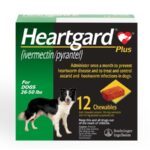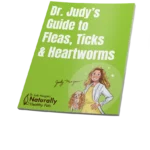This is very important to make sure you discuss with your veterinarian considerations of putting your dog on a Heartworm Prevention medicine and to minimize the risk. The singular monthly pill is a good form of preventative medicine (not combined with flea and tick) (Heartgard Plus) and is designed to circulate in the bloodstream for a short period, so when you give the pill to your dog monitor them closely for several days and record any reaction with you vet or your dogs health diary.
Remember, even if your dog is on prevention medicine, it does not guarantee 100% to prevent heartworm so you should always keep your pet away from insect infested areas where bugs, mosquitos and insects thrive, like wet areas and areas with woods and tall grass and spray your dog down with Natural Topical Insect Repellent when going to places where insects thrive.
It is more appropriate to review Heartworm Prevention on its own singularly and not combine it with other prevention modules.
Talk with your veterinary about which prevention medicine they feel is the best and as a pet owner, it is best to read the drug manufacturers specification sheet on the drug, so as a pet owner you understand the drug.
Heartworm is different than flea & tick, whereas Heartworm is transmitted thru mosquitos. So regardless of being on prevention medicine it is safest to always keep your dog away from exposure to areas where mosquitos thrive, such as still water ponds, grassy areas and heavily shaded or wooded areas. If your dog is not on heartworm prevention and is outside a lot, they could be at a great risk of contracting heartworm thru mosquito bites. Heartworm prevention is a systemic (pill) form where the prevention drug gets into the blood thus hopefully killing any larvae in the blood. If you are going to visit wet areas or wooded areas, you can also spray your dog with organic type insect repellants to help minimize the risk of mosquito bites, but your dog should be on heartworm prevention as well as that is essential.
As a pet owner you should research proper and safe Heartworm prevention as you review your options and consult with your veterinary.
We recommend you research Heartworm Prevention singularly and do not combine your research with Flea & Tick, which is different with several different options and the risk and effectiveness are different than that of Heartworm prevention.
Please see the tab under ‘Flea & Tick’. Discuss these items with your veterinary and please do the research on the drugs you give your dog, read about the drugs and understand the risk, dosage rates and what the allergic reaction symptoms are. Always watch your dog closely after giving them systemic drugs. If you notice any allergic reactions, even if minor symptoms, please report them to your veterinary and consult with your veterinary.
“Routine administration of heartworm prevention products is effective at preventing disease when bitten by an infected mosquito. In much of the US and parts of Canada, heartworm prevention is recommended for all dogs year-round as part of routine wellness care. There is some variation based on climate and expected exposure to mosquitoes. Dogs participating in group settings in areas where heartworm prevention is recommended should receive preventative. Any dog that is positive for heartworm disease can infect mosquitoes that bite them passing it on to other dogs that are bitten. Even puppies that are too young to begin treatment can become infected, so additional mosquito protection may be needed for them if this risk is present.” Source – Infectious Disease in Dogs in Group Settings, 2016.
Heartworm Prevention Medication
“If you’re concerned about combining heartworm medication with flea and tick products, Heartgard is a good choice, as it doesn’t target fleas or ticks. This means that it can usually be safely combined with other flea and tick medications. However, Heartgard is not safe to combine with a flea and tick medication if that second medication also contains heartworm medication. Consult your veterinarian if you’re not sure about a medication choice.” Source – PetCareRX
Heartworm Prevention Side Effects Are Very Rare
“Like any medication, prescription heartworm prevention isn’t completely without risk. Side effects are possible, but most are quite mild and infrequent. Heartworm Prevention is Much Less Risky than Heartworm Disease Treatment. The risks of conventional heartworm prevention are much smaller than those associated with leaving your dog open to developing a potentially fatal case of heartworm disease. Talk to your veterinarian if you’re concerned about overmedicating your dog. They can help you develop a preventative heartworm plan that is safe for your pet.” Source – PetMD



